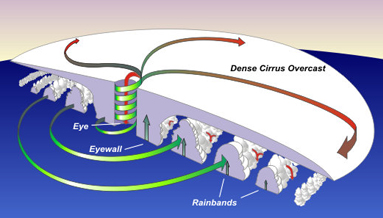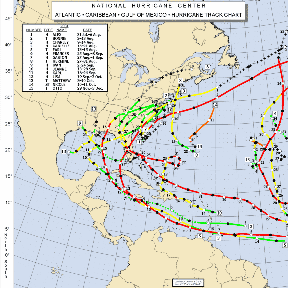Since your family might be stuck in a house or shelter while waiting for a hurricane to pass…we collected some info about the science and history of hurricanes. Add comments with your favorite resources.
Hurricane Quiz:
- Who names Hurricanes?
- How is Hurricane strength measured?
- What year was a hurricane barrier built in Providence, RI?
- How big are hurricanes?
- Where did the name hurricane come from?
- What are other names for hurricanes around the world?
- Where and how do hurricanes start?
- How do you know when a hurricane is coming?
- What makes a hurricane weaken and stop?
General Resources:
General Info
Earth Science
Glossary
Saffir-Simpson Scale
Hurricane Names
Preparedness Week info
Hurricane Guide (PDF)
Blank Tracking Charts:
Color
Black&White
Lots of other tracking maps
Images from space:
NASAtelevision View from International Space Station
NOAAÂ Visualizations
Irene animation
Current Storm Tracking
National Weather Service
National Hurricane Center
Central Pacific Hurricane Center
National Climatic Data Center
NOAA Coastal Services Center
google earth
google maps
Weather Underground
GoLocalProv
Weather.com
Historical Storm Information
Watch PBS Online: Hurricane of ’38Â
Hurricane Barrier
Atlantic hurricane lists
Don’t forget to prepare early!











I hope everyone is safe–it looks like the areas north of us got hit harder.
10 Tips from Sesame Street for dealing with disasters.
See original document
http://tinyurl.com/3zphngt
and full site: http://tinyurl.com/3wq9rfj
SAFE & SOUND: Tips for Parents and Caregiver
Hurricanes, storms, and any stressful events can be particularly
difficult for young children who may not fully understand what’s going
on around them. These tips can help them feel safe, cope with emotions,
and understand that there is hope for the future.
Give Children the Facts
Children might still be confused about what
exactly a hurricane is. Explain that it is a big storm with a lot of
wind and heavy rain. It can be scary, but adults will do their best to
keep children safe.
Comfort Your Children
Try to calm your own fears first, since children
take your cues. Answer questions honestly and age appropriately, in
simple words. Reassure them that what happened is not their fault, and
that you love them and will take care of them. Hugs help, too!
Listen and Talk to Your Children
Follow your children’s lead. They may
not want to talk about their emotions and experiences right away. If
they prefer not to talk, play with them and spend time doing what they
like to do. If they express sadness, anger, or fear, tell them it’s okay
to feel this way, and encourage them to continue sharing their feelings
with words or pictures.
Try to Keep a Normal Routine
As much as possible, try to keep a daily
routine. To help children feel calm and safe, encourage them to engage
in favorite activities.
Spend Time With Your Children
Simply smiling, laughing, and playing
together can also help children feel safe. Encourage them to do things
that can help them express their emotions, such as writing a story or
drawing a picture.
Pay Attention to Signs of Stress
Nightmares, bed-wetting, aggression,
inattentiveness, and clinging behavior are common among children who
have experienced a crisis. If you notice such signs, please talk to a
health care provider, teacher, school counselor, or mental health
professional.
Monitor Children’s TV Viewing
Don’t allow children to watch repeated
images of the hurricane, its damage, and other violent events. Young
children might think that it’s happening repeatedly, in real time.
Empower Your Children
If your children have been directly affected by
the hurricane, you can give them simple chores and responsibilities to
help them maintain a sense of control. Praise their efforts—building
self-confidence is important when joining a new community. If children
have been indirectly affected, encourage them to show compassion and
help others.
Take Care of Yourself
You’re more helpful to your children when you’ve
attended to your own physical and emotional needs. Build a support
system through relatives, friends, faith leaders, or counselors. Stay
active, get enough rest, eat healthfully, and do things you enjoy.
Inspire a Sense of Hope
Explain that while many things may have changed,
there are people and places we can always “hold in our hearts.†Explain
that no matter what has happened, you still have each other to build a
better future.